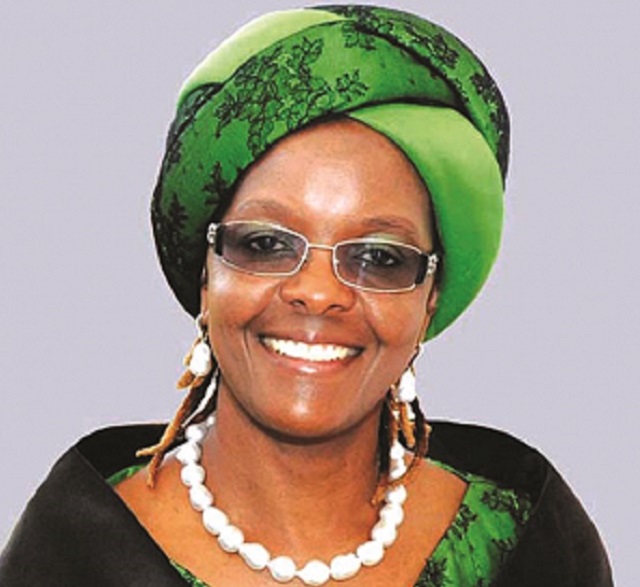Dr Amai Mugabe: Patron of charities

Features Desk
The First Lady Dr Grace Mugabe, a renowned philanthropist, is patron of several charities. Here we profile the work of some of the charities privileged to have Dr Mugabe as patron.
Danhiko Project
She is a patron of Danhiko Project, which houses and takes care of people with disabilities. Danhiko is the name of a training centre which was set up in Harare in 1981 in the wake of Zimbabwe’s liberation struggle, initially to provide education for ex-combatants who had returned from war having sustained injuries.
Danhiko is a Shona word meaning, simply, a stepladder. For many disabled people it has come to symbolise much more of an opportunity to climb up from the ground to meet the summit of their aspirations and abilities. Today, it provides education and training to students who cannot access other means of learning and training. Sometime in 2007 Danhiko Project celebrated its anniversary and the First Lady and the then Chinese Ambassador to Zimbabwe Yuan Nansheng were special guests at the celebrations to mark the occasion. Dr Mugabe was named patron of Danhiko Project on that colourful day.
Danhiko Project encourages underprivileged people to exercise their responsibilities and participate actively and positively in their communities by providing orientation, technical and professional information. Various professional courses are taught at the institution. The criteria for the courses are that the skills taught must be suitable for students with disabilities and be appropriate for formal or self-employment.
The training must also be practical enough for undertaking production while undergoing training. The mission and vision of the project is centred firmly on the deliverance of quality education, training and production for the disadvantaged in society by creating employment or self-employment for them.
Danhiko has continued to grow and flourish since 1981.
Several well-wishers and organisations continue to support the project. Delta Corporation is among the organisations which support Danhiko project as part of its corporate social responsibility programme. Danhiko is renowned for hosting the Paralympic Games every year in Harare. Dr Mugabe has been one of the supporters of the games showing her zeal for sport for people with disabilities.
The games have become an annual event where people from all parts of the country and beyond come together in support of people with disabilities.
Because of the popularity of the games, the Danhiko Sports Administration has been overwhelmed by a ballooning number of clubs participating every year in the Paralympic games. The Danhiko games have helped to improve sporting excellence among people with disabilities.
Musha Mukadzi Zimbabwe Armed Forces Foundation
It is a non-profit organisation that provides programmes that help families of the armed forces of Zimbabwe wives and widows and children of either serving or retired soldiers as well as war veterans. It is the brainchild of the Commander of the Defence Forces, General Constantino Chiwenga. Mrs Marry Chiwenga is the national chairperson.
Musha Mukadzi offers a host of programmes, and resources, focused in the areas of non-communicable diseases, disabilities and even poverty. The foundation was launched in 2012.
Vision
– To have a society that realises the potential in women
– To be captains of industries without being discriminated against
– To have a women empowered and self-motivated society
– To erase dependency syndrome amongst women
Mission
To create an awareness of women role in society without borders or boundaries
Values
– Increasing independence, self-sustainability and confidence among women of the armed forces
– Identifying and exercising values in giving and volunteering
– Demonstrating the extraordinary impact of women in the society
Musha Mukadzi engages in dialogue to seek collaborative methods that will lead to sustainable and positive change.
Aids Counselling Trust
ACT is a non-profit organisation that was registered under the Private Voluntary Act on 7 June, 1989. Its purpose is to complement government initiatives in the prevention of HIV infection, strengthening and provision of care and support to people living with HIV and Aids and their families.
ACT started as a result of a series of meetings that were held at St Anne’s Hospital in Harare in 1988. Members were citizens concerned with the rapid spread of HIV and its effect. They represented nongovernmental organisations, medicine, social science and the clergy. A steering committee which represented the following sectors was put in place. These were, Ministry of Health, The Church, Department of Social Welfare, Non-governmental Organisations, University of Zimbabwe, School of Social Work, City Health Department.
ACT moved to its own premises in 1991. The structure was adapted from being managed by a steering committee to a hierarchical one. Systems and procedures have been developed over the years in order to be more effective and efficient in carrying out its mandate.
ACT is a membership organisation and is governed by a Board whose members represent diverse disciplines and sectors. Training is given to the Board on “Governance” for them to understand their roles and responsibilities, and also on “Procedure of Meetings”. The Board conducts its business through quarterly meetings. The Treasurer oversees and advises on the financial performance of the organisation. The executive director is the primary signatory on all accounts and the Treasurer co-signs. Two other signatories sign in the absence of the Treasurer. Financial accounts are audited every year by a reputable company and these are presented to the Annual General Meeting.
ACT’s method of operation
ACT’s method of operation is that of facilitating and strengthening the work of communities so that they can be more effective in responding to challenges as dictated by local needs. Initially, the focus was on prevention. As time went on and there was advancement in the management and treatment of HIV and Aids as well as emergency of other challenges to life, ACT’s programming took a general developmental approach. This approach continues to guide all programming. ACT has maintained a small staff contingent so that most resources are channelled to communities.
The organisation’s work is heavily dependent on community volunteers who keep ACT visible within their localities. Disabilities and gender mainstreaming are crosscutting themes. By ACT’s own policy, there is representation of people living with HIV at every level of the organisation.
ACT Programmes
– Advocacy, Lobbying and Civic Education
– Collect material human sections constitution.
– Monitoring human advocate facilities
– Advocate for allocation of antiretroviral treatment
– Children’s support groups; PSS camps; Mobile toy and book library;
– Counselling;
– Educational assistance;
– Sexual and Reproductive Health and Rights
This programme focuses on the following:
Women’s and Young People’s Sexual Reproductive Health and Rights; Gender Based Violence; HIV and Aids; Treatment Literacy and Prevention; Behaviour Change Communication; Mobilise male engagement and participation in HIV, GBV and SRHR
Forty-two percent of women in Zimbabwe have either experienced physical, emotional or sexual violence (or both) at some point in their lives.
Closely linked to GBV is the spread of HIV. Sexual violence and gender inequalities fuel the spread of HIV. This is evidenced by the statistics which show that adult women are 1.3 more likely to be infected with HIV than males.











Comments